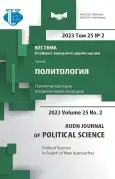Heuristic Potential of Applying the Assessment Index to Regional Public Programs in the Field of Youth Policy
- Autores: Kalashnikova S.K.1,2, Andriiv I.I.1,2
-
Afiliações:
- Institute of Scientific Information for Social Sciences of the RAS
- St. Petersburg State University
- Edição: Volume 25, Nº 2 (2023): Political Science in Search of New Approaches
- Páginas: 486-499
- Seção: YOUTH IN POLITICS: METHODS OF STUDYING
- URL: https://journal-vniispk.ru/2313-1438/article/view/322239
- DOI: https://doi.org/10.22363/2313-1438-2023-25-2-486-499
- EDN: https://elibrary.ru/QJHIPF
- ID: 322239
Citar
Texto integral
Resumo
The aim of the research is to determine the possibilities and limitations of applying indices for assessing regional youth policy in the Russian Federation. The article contains a detailed analysis of domestic and foreign scientific literature on current methods for evaluating state youth policy and possibilities of applying indices in this sphere. The comparative analysis of the use of indices for assessing youth policy in the CIS countries was conducted. The authors propose an index of complex evaluation of regional state programs based on the correlation between the data on the budgeting of the youth policy sphere in the subjects and the migration indicators of this age group. As a result of empirical research, the authors have identified groups of regions of the Russian Federation with different levels of funding of the investigated sphere and the degree of sufficiency of budgetary provision to maintain a neutral balance of youth migration.
Palavras-chave
Sobre autores
Sofia Kalashnikova
Institute of Scientific Information for Social Sciences of the RAS; St. Petersburg State University
Autor responsável pela correspondência
Email: sofyakalashnikova15@gmail.com
ORCID ID: 0000-0001-9837-3363
junior research fellow, Institute of Scientific Information for Social Sciences of the RAS, Postgraduate of the Department of Political Institutions and Applied Political Research, St. Petersburg State University
Moscow, Russian Federation; Saint Petersburg, Russian FederationIrina Andriiv
Institute of Scientific Information for Social Sciences of the RAS; St. Petersburg State University
Email: andriiv99@mail.ru
ORCID ID: 0000-0002-1487-3916
junior research fellow, Institute of Scientific Information for Social Sciences of the RAS, Under student of the Department of Political Institutions and Applied Political Research, St. Petersburg State University
Moscow, Russian Federation; Saint Petersburg, Russian FederationBibliografia
- Artykov, S.T. & Kasatkina, E.A. (2020). Youth policy as an object of state and municipal management. Bulletin of Udmurt university. Economics and law series, 30(2), 200–207. https://doi.org/10.35634/2412-9593-2020-30-2-200-207 (In Russian)
- Berezutskiy, Y.V. (2020). Youth policy and its role in the realization of life priorities of youth and regions: far eastern specificity. In State youth policy: national projects 2019–2024 in the social development of youth, 157–166. (In Russian)
- Bizin, S.V. (2022). Strategic analysis of regional youth policy and regional staffing assessment. Journal of Economics, 12(2), 879–896. https://doi.org/10.18334/epp.12.2.114252 (In Russian)
- Blinnikova, О.N. & Pachin, R. (2020). Approaches to the study of youth policy. Human. Society. Science, (1), 79–83. https://doi.org/10.53015/2686-8172_2020_1_79 (In Russian)
- Bushueva, T. & Grishaeva, E. (2020). The use of evidence-based approaches in the practice of evaluating the effectiveness of youth policy in Russian Federation. In State regulation of socio-economic processes of the region and the municipality: challenges and answers of our time, 190–197. (In Russian)
- Goncharova, N. & Surova, E. (2021). Problems of assessing the effectiveness of youth policy. Structural transformations of the economy of the territories: in the search for social and economic equilibrium, 87–90. (In Russian)
- Dzhakupova, D.E. (2020). Potential of application of youth development index to assess the efficiency of youth policy development in the Republic of Kazakhstan. Bulletin of the Russian University of Cooperation, 41(3), 35–39. (In Russian)
- Kulikov, S.P. (2019). Relevance of formation unified system of criteria and methods performance assessments youth outreach authorities. Economics and Governance, 104(11), 197–202. (In Russian)
- Miroshnichenko, I.V., Shpiro, L.A. & Fedorenko, K.A. (2022). The project approach in russian state youth policy: institutional practices and development potential. South Russian Journal of Social Sciences, 23(1), 26–47. https://doi.org/10.31429/26190567-23-1-26-47 (In Russian)
- Okorokova, M.P. (2016). Methodological Framework for Youth Policy Research. Political science issues: materials of the II International Scientific Conference, 12–15. (In Russian)
Arquivos suplementares









